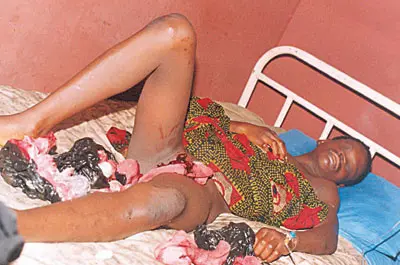LAST week, the Centre for Environment, Human Rights and Development, an NGO, reported that in 2012, no fewer than 1, 200 girls were raped in Rivers state.
The state Project Officer of the body, Michael Gbarale, who is also the chairman of the Child Protection Network, added that: “of this figure (of 1,200), gang rapes were more frequent”.
49 cases were reported to the Network, while 800 others, were treated by ‘doctors without border’. Out of the 49 cases taken to the Child Protection Network, 11 were gang rapes; 44 were ordinary rape cases.
In another survey to investigate high HIV prevalence and lower age for sex among adolescents between 10 and 19 years, carried out by the Positive Action for Treatment Access (PATA), it found out that: “forced sex was the third main reason for sexual debut” after love and peer pressure. It said that more than 31.4 percent of girls, many of them living with HIV, reported “forced sex” or rape as the basis of first sexual encounter.
Doctor Morenike Ukpong who presented the study at a national dialogue on adolescents living with HIV in Nigeria, told DAILY TRUST, that “if 31.4 percent of females can report their first sexual debut as rape, I think it is an epidemic…We have an epidemic called rape that we are not addressing. It is something to weep over”.
Dr. Ukpong went on that “for many of those who are HIV positive, their exposure to HIV is because of rape. It is a risk factor for HIV infection and we are not dealing with that”. Some of those in the study were as young as seven: “the man said if I tell my mum or dad he would kill me.
He showed me a knife and I was afraid, I was just seven years old then. He was sleeping with me everyday and I was fearful to talk to anybody. I bled, my sister saw it but I could not tell her what happened…” Stories like these are in the media almost on a daily basis in Nigeria.
There was a report from Auchi, where students at the Polytechnic, kidnapped their classmate, raped her for days and later killed her. There are postings of horrific pictures of young men, somewhere in Rivers state, who raped a girl and then buried her alive, but were discovered by military men.
They were forced to exhume the corpse and the video was posted on the internet! Or the girl that was raped and a huge staff was stuff into her as she laid dead.
A few years ago, I noticed that in WEEKLY TRUST, we were carrying regular stories from around Northern Nigeria, of the rape of minors, between two and eight years.
I put a reporter on the trail to be able to do an investigative piece, while I also did a column. In the period since, there has developed almost a boom industry in rape all over our country.
There are several cases of fathers abusing their children too and in many of the cases, these rapists would blame their act on the devil! Clearly, there is something fundamentally broken in our country. The epidemic of rape has deep sociological and even biological factors.
In a society of deep-seated male chauvinism, reinforced by the erosion of economic power, there is a serious crisis of virility and esteem, which is falsely reclaimed in acts of violence against women. Rape has been studied in many places as part of a package of false consciousness, where a rapist imagines himself as expressing male power in domination of the victim.
There is also the breakdown of the family and the ability to have healthy sexual life in marriages, in societies where it has become difficult to marry, due to economic reasons. This is especially true in Muslim communities in Northern Nigeria, where religious restraint is also breaking down, especially in the urban setting.
People have grown up in a culture of separation of the sexes and rape is one of the avenues for encountering the woman, who might just be a minor as we have seen in many media reports in the North and even beyond.
Even economic hardship has hamstrung individuals’ ability to seek the comfort of commercial sex workers; and a few weeks ago, the press reported a young man, somewhere in Eastern Nigeria, who “specialised” in raping very elderly women! Arrested, he confessed that he couldn’t get young girls, so he targeted the elderly.
We have not by the narrative underplayed the serious criminality that rape represents and as we have seen from the study of adolescent sex and HIV infection, the consequences of the epidemic of rape that we live with today, are very grave!
Nigerian sociologists, other social scientists, religious bodies and social workers, the state and society at large, must become far more conscious of the seriousness of the issue rape. We must not bury our heads in the sand, because even our children, loved ones and neighbours can become victims!
There is no gainsaying the fact that something is broken in the Nigerian society today and the epidemic of rapes merely reflects and reinforces the desperate social situation in contemporary society. The epidemic of rapes damages the humanity of the victims and dehumanises all of our society; we must not let it roll us over completely!


